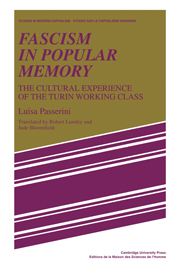Summary
Oral sources and the historical study of culture
Oral testimonies are used in this work for what they tell us, directly and indirectly, about the everyday side of culture. This is taken to include the following: the ‘mentalities’ characteristic of (though not exclusive to) the working population; the understanding of the world passed down from generation to generation through oral tradition; the conflicts of power that take place on a cultural and symbolic plane rather than within a narrow political sphere. This approach to oral sources, which need to be used in conjunction with other sources, opens the way for analysis of behaviour in society.
The research began with the conviction – confirmed during the course of the work – that essential for an understanding of history is not just knowledge of the lives of obscure and ordinary individuals (all of us, in one way or another), but information about the ideas feeding into their everyday experience. It is true that these ideas (self-images, myths, stories and jokes) are for the most part belied by reality. And yet, all these mental representations are the other face of reality, which includes and is shaped by them. A parallel can perhaps be drawn with the way dreams during sleep are indispensable to life during waking hours. Out of this arises the curious life led by mental representations – their constant ambivalence, their power to form diverse associations in a dynamic of continuity and change, being both functional to and distinct from the social division of labour.
- Type
- Chapter
- Information
- Fascism in Popular MemoryThe Cultural Experience of the Turin Working Class, pp. 1 - 16Publisher: Cambridge University PressPrint publication year: 1987

